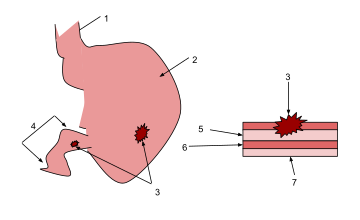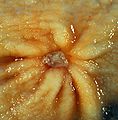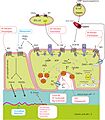Peptic ulcer disease facts for kids
Quick facts for kids Peptic ulcer disease |
|
|---|---|
| Synonyms | Peptic ulcer, stomach ulcer, gastric ulcer, duodenal ulcer |
| Symptoms | Heartburn, upper abdominal pain, nausea, belching, vomiting, blood in the stool, weight loss, weight gain, bloating, loss of appetite yellowing of the skin and whites of the eyes difficulty swallowing |
| Complications | Bleeding, perforation, ulcer perforation, blockage of the stomach |
| Causes | Helicobacter pylori bacteria, non-steroidal anti-inflammatory drugs (NSAIDs), tobacco smoking, Crohn's disease |
| Diagnostic method | Based on symptoms, confirmed by endoscopy or barium swallow |
| Similar conditions | Stomach cancer, coronary heart disease, inflammation of the stomach lining, gallbladder inflammation |
| Treatment | Medications, stopping NSAIDs, stopping smoking, stopping alcohol consumption |
| Medication | Proton pump inhibitor, H2 blocker, antibiotics |
| Frequency | 87.4 million (2015) |
| Deaths | 267,500 (2015) |
Peptic ulcer disease (PUD) happens when a sore forms in the inner lining of your stomach, the first part of your small intestine, or sometimes the lower part of your esophagus (food pipe).
If the sore is in your stomach, it's called a gastric ulcer. If it's in the first part of your intestines, it's a duodenal ulcer.
Common signs of a duodenal ulcer include waking up at night with upper abdominal pain. This pain often feels better after you eat. For a gastric ulcer, the pain might actually get worse when you eat. The pain is often described as a burning feeling or a dull ache. Other signs can be belching, throwing up, losing weight, or not feeling hungry. Sometimes, older people might not have any symptoms at all.
About 1 in 10 people get a peptic ulcer at some point in their lives. In 2015, about 87.4 million people worldwide had new ulcers.
What Causes Ulcers?
The two main reasons people get peptic ulcers are:
- A type of bacteria called Helicobacter pylori (often shortened to H. pylori).
- Taking certain pain relievers called non-steroidal anti-inflammatory drugs (NSAIDs), like aspirin.
Other less common causes can include tobacco smoking or stress from other serious health problems.
How H. pylori Causes Ulcers
H. pylori is a common type of bacteria. It can live in your stomach and cause problems. This bacteria makes a substance that changes the environment in your stomach, making it easier for the bacteria to survive. It also attaches to the stomach lining and can cause inflammation. This inflammation can lead to ulcers.
How NSAIDs Cause Ulcers
NSAIDs are medicines that help with pain and inflammation. But they can also harm your stomach lining. Your stomach has a protective layer of mucus. This mucus helps shield your stomach from strong stomach acid. NSAIDs can block the chemicals that help create this protective mucus. This makes your stomach lining weaker and more likely to get an ulcer.
Can Stress or Diet Cause Ulcers?
In the past, people thought stress or spicy foods caused ulcers. Now we know that's not usually true. While severe stress from serious health issues can cause ulcers, everyday stress or spicy foods are not the main causes. Eating certain foods or drinking coffee usually doesn't cause or worsen ulcers either. Alcohol might slightly increase the risk if you also have H. pylori, but it's not a main cause on its own.
Signs and Symptoms
Peptic ulcers can cause different symptoms. You might have one or more of these:
- Pain in your stomach area, usually in the upper part. This pain often relates to when you eat.
- For duodenal ulcers, the pain might appear about three hours after a meal and can wake you up at night.
- For gastric ulcers, the pain might happen during or after a meal, and you might feel sick or throw up.
- Feeling bloated or full in your stomach.
- Feeling sick to your stomach and throwing up a lot.
- Not feeling hungry and losing weight (more common with gastric ulcers).
- Gaining weight (sometimes with duodenal ulcers, because eating makes the pain better).
- Throwing up blood (this is called hematemesis).
- Dark, tar-like, bad-smelling poop (this is called melena) because of blood in it.
Sometimes, an ulcer can make a hole in the stomach or intestine wall. This is a serious problem that causes sudden, very sharp pain and needs immediate surgery.
The pain from an ulcer can feel like a burning or gnawing feeling in your stomach. It can last from 30 minutes to a few hours. This pain might feel like hunger, indigestion, or heartburn. It's often worse when your stomach is empty. The pain can also flare up at night. Eating foods that calm stomach acid or taking antacid medicine can sometimes temporarily make the pain better.
Complications
Ulcers can lead to serious problems if not treated:
- Bleeding: This is the most common problem. If a lot of blood is lost quickly, it can be very dangerous.
- Perforation: This means a hole forms in the wall of your stomach or intestine. Stomach contents can leak into your belly, causing severe pain and needing emergency surgery.
- Blockage: Ulcers can cause scarring and swelling that narrows the opening from your stomach to your small intestine. This can make you throw up a lot.
- Cancer: In some cases, especially with H. pylori infection, there's a slightly higher risk of stomach cancer.
How Doctors Diagnose Ulcers
Doctors usually suspect an ulcer based on your symptoms, like stomach pain. Sometimes, they might start treatment without specific tests to see if your symptoms get better.
To confirm an ulcer, doctors might use tests like:
- Endoscopy (EGD): This is the best way to diagnose an ulcer. A doctor puts a thin, flexible tube with a camera down your throat to look at your esophagus, stomach, and the first part of your small intestine. They can see the ulcer and even take a small tissue sample (biopsy).
- Barium swallow: You drink a special liquid that shows up on x-rays. This helps doctors see the shape of your stomach and intestines and if there's an ulcer.
If doctors suspect H. pylori infection, they can test for it using:
- Urea breath test: You drink a special liquid, and then blow into a bag. If you have H. pylori, the bacteria will break down the liquid, and a certain gas will show up in your breath. This test can also check if the treatment worked.
- Stool antigen test: This test looks for signs of the bacteria in your poop.
- Blood test: This test looks for antibodies to H. pylori in your blood. However, it can't tell if you have a current infection or had one in the past.
- Biopsy: A small tissue sample taken during an endoscopy can be checked for the bacteria.
It's important to rule out other conditions that have similar symptoms, like stomach cancer or inflammation of the stomach lining.
Types of Ulcers
Ulcers are named based on where they are found:
- Duodenal ulcer: In the duodenum (first part of the small intestine).
- Esophageal ulcer: In the esophagus (food pipe).
- Gastric ulcer: In the stomach.
Preventing Ulcers
If you need to take NSAIDs, especially for a long time, your doctor might give you other medicines to help prevent ulcers. These can include proton pump inhibitors (PPIs) or other medications that reduce stomach acid. Some NSAIDs that are more selective (called COX-2 inhibitors) might also lower the risk of ulcers compared to older NSAIDs.
Treating Ulcers
Treatment for peptic ulcers depends on what caused them.
Treating H. pylori Infection
If H. pylori is causing your ulcer, doctors will give you a combination of medicines to kill the bacteria. This usually includes:
- A proton pump inhibitor (PPI) to reduce stomach acid.
- Two different antibiotics, such as amoxicillin and clarithromycin.
This treatment usually lasts for 7 to 14 days. It's very important to take all your medicine as prescribed to make sure the bacteria are completely gone.
Treating NSAID-Induced Ulcers
If NSAIDs caused your ulcer, the first step is to stop taking those medicines if possible. Doctors will also give you medicines like PPIs to help the ulcer heal. These ulcers usually heal in 6 to 8 weeks.
Treating Bleeding Ulcers
If an ulcer is bleeding, it's a serious situation that needs quick medical help. Doctors might:
- Give you fluids through an IV to replace lost blood.
- Perform an endoscopy to stop the bleeding. They can use heat (cautery), special clips, or inject medicine to stop the blood flow.
- In very serious cases where endoscopy doesn't work, surgery might be needed to fix the bleeding.
History of Ulcer Discovery
For a long time, people thought stress and spicy foods were the main causes of ulcers. But in 1982, two Australian scientists, Robin Warren and Barry Marshall, made a huge discovery. They found the Helicobacter pylori bacteria and showed that it was a major cause of ulcers and stomach inflammation.
Their idea was not easily accepted at first. To prove their point, Barry Marshall even drank a dish of H. pylori bacteria himself! He developed gastritis (stomach inflammation) just a few days later, which supported their theory. His symptoms went away after a couple of weeks with antibiotics.
This amazing discovery changed how doctors understood and treated ulcers. In 2005, Warren and Marshall received the Nobel Prize in Physiology or Medicine for their groundbreaking work. Thanks to them, ulcers are now known to be a curable infection, and treatment has become much more effective.
Images for kids
See also
 In Spanish: Úlcera péptica para niños
In Spanish: Úlcera péptica para niños
 | May Edward Chinn |
 | Rebecca Cole |
 | Alexa Canady |
 | Dorothy Lavinia Brown |







